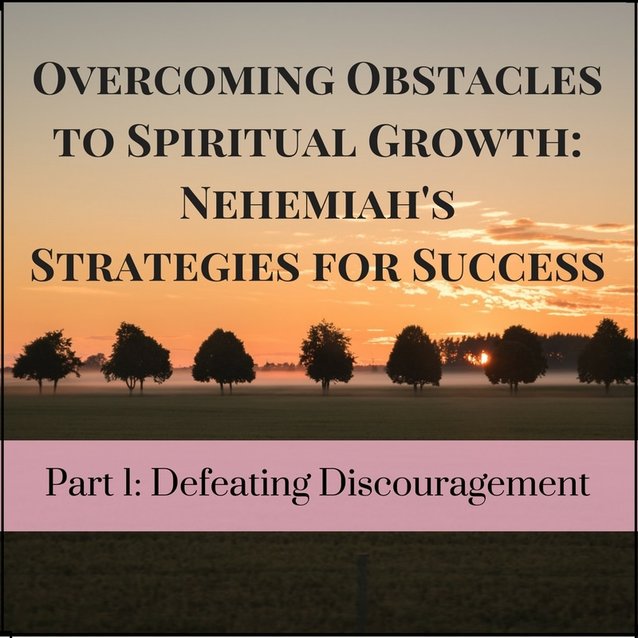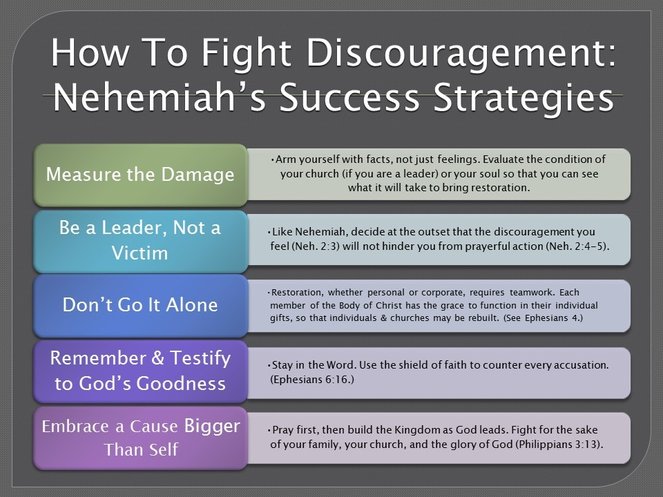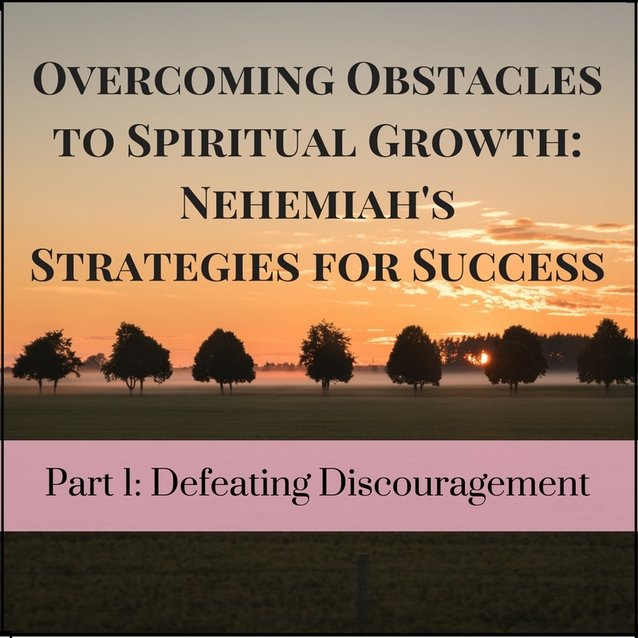|
It’s easy to be excited about prophetic words, especially when they promise growth, expansion, restoration, or blessing. The prophetic word I released at the beginning of 2017 contained all of those. God is speaking about Kingdom expansion in the coming year. Yet God also gave us a prophetic mandate to re-examine Nehemiah’s “growth strategies,” found in the scriptures. This post on discouragement is the first in a series I will write on combating the enemy’s attacks during a time of growth.
The prophetic word God released for 2017 contained 5 warnings for believers (Click here to read or review the full word):
In studying Nehemiah, I discovered that these 5 warnings above correspond to the 5 enemy attacks against Nehemiah’s rebuilding of the wall. I’d like to tackle these warnings individually after taking a brief look at the overall purpose of Nehemiah, which remains our purpose today. Nehemiah's Purpose
Nehemiah was a type of Christ. He left his position at the side of a King to come restore his people, who had been destroyed by enemy attacks. Nebuchadnezzar had broken Jerusalem’s walls and burned her gates with fire 70 years earlier, sending the Jews into exile. Although many Jews had returned to their land with Ezra, the city still lay in ruins.
Nehemiah’s grief, combined with a holy jealousy for God’s honor and compassion for his brethren, moved him to action. Functioning in an apostolic role, Nehemiah returned with the favor, finances and blessing of the king, surveyed the damage, and then restored the foundations and rebuilt the wall that protected the Jewish nation and its temple. In the same way today, God longs to restore individuals and churches to what they should be: holy temples full of true spiritual worship, built on the cornerstone of Christ and the foundation of love, unity and reconciliation that was revealed to the apostles and prophets. (See Ephesians 2-4 for supporting scriptures.) Unfortunately, even a quick survey of the damage and division in the Body of Christ is enough to dishearten those who wish to build. A great deal of perseverance is needed for modern ministers, along with wisdom to anticipate and prevent further attacks of the enemy. Discouragement is one of the most paralyzing attacks. Attack #1: Discouragement, Mockery and Mind Games
Nehemiah’s secret “night ride” through a devastated Jerusalem revealed, even in darkness, the extent of Nebuchadnezzar’s previous damage. As he viewed the Fountain Gate and the King’s Pool, there was so much rubbish that “there was no room for the animal under me to pass.” (Nehemiah 2:14, NKJV.) Yet the one who was unafraid to both measure and experience the damage was the same one who was moved enough to rebuild it. To restore something, you must first do an honest assessment of its condition, counting the cost.
The inherent danger of self-assessment is that it can stir up discouragement, fear, or anger. It can reopen wounds caused by hatred or prejudice. Reminders of damage, whether personal or corporate, can cause us to not want to forgive, spiraling downward into hopelessness and depression. The Jews in Jerusalem had allowed discouragement to paralyze them. Although they had safely returned home from exile, they lived among the ruins of the past. How did Nehemiah combat the enemy’s discouragement and depression? He addressed the Jews publicly in 2:17-18, saying:
Unfortunately, this wasn’t the only time Nehemiah encountered discouragement. The first of these 5 direct attacks of the enemy in Nehemiah included mockery and accusations from an evil triumvirate: Sanballat, Tobiah, and Geshem: all governors and officials, and all motivated by Satan. (See Nehemiah 2:19.) The Bible says they were “deeply disturbed that a man had come to seek the well-being of the children of Israel.” (Nehemiah 2:10, NKJV.) Immediately following Nehemiah’s inspiring address and testimony, the enemy launched verbal insults and ridicule, saying that Nehemiah was rebelling against the king. These were mind games, designed to stop the work before it began. The enemy still launches arrows of doubt and insults to discourage us today. For this type of attack, we need the shield of faith: “So I answered them, and said to them, ‘The God of heaven Himself will prosper us; Just as Nehemiah raised his shield of faith, so we also must raise ours, speaking out loud against the enemy when he torments us with thoughts of doubt, discouragement, or defeat. (Click here to watch a follow-up post on YouTube regarding a vision the Lord gave on overcoming discouragement!) Later, in Nehemiah 4:10-11, the workers became discouraged again while under attack, saying: "The strength of the laborers is failing, and there is so much rubbish that we are not able to build the wall. And our adversaries said, 'They will neither know nor see anything, till we come into their midst and kill them and cause the work to cease.'" Nehemiah countered their discouragement with another verbal exhortation: “Do not be afraid of them. Remember the Lord, great and awesome, and fight for your brethren, your sons, your daughters, your wives, and your houses.” Defeat Discouragement: Nehemiah's Success Strategies
Like fear, discouragement offers us two choices: fight or flight. Here's a summary of how Nehemiah chose to fight the attacks of his enemies. It's a helpful reminder of the essentials when we're under attack.
|
Free Link to the Subscriber Resource Library when you join His Inscriptions!
About
Deborah Perkins Categories
All
Archives
June 2024
AuthorA severe hearing loss from childhood caused Deborah Perkins to develop what she now calls her secret weapon: tuning in to God's voice. A Wellesley College graduate and an award-winning writer, Deborah is now a wife and mother of 3 boys. Deborah has devoted over 25 years to professional and lay Christian ministry in New England and beyond. Her passion is inspiring people to cultivate greater intimacy with God. |








 RSS Feed
RSS Feed






